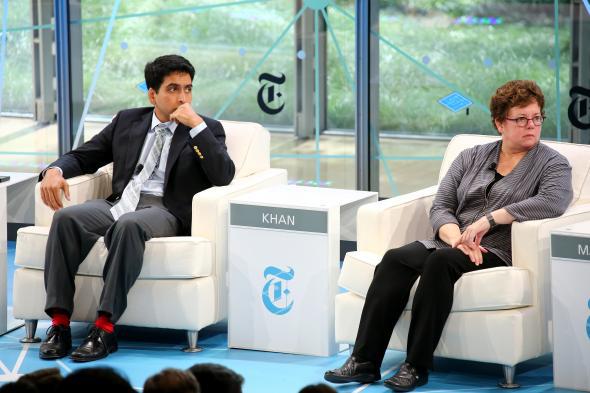Last week’s big news about the new SAT redesign included a very important footnote: In the name of fairness to students who can’t afford $999 Princeton Review classes, the College Board now plans to partner with online learning platform Khan Academy to offer free test-prep materials for the exam.
Better yet, they might be really good test prep materials. As Time reports:
Khan Academy is one of the most respected online education platforms in the country, and it will enjoy exclusive early access to the new SAT, something that’s never been done before in the history of the College Board, which makes the test. That edge will make it harder for other companies to sell families an advantage through months of elite—and expensive—prep classes or tutoring.
Research has shown that students who take SAT review classes only improve their scores by small margins. But that’s sort of besides the point here. Test prep is a billion-dollar industry, and presumably some families are stretching themselves financially to pay for courses that may or may not offer much value, out of a vague sense that to do otherwise would shortchange their children. Any quality, low-cost alternative to the Princeton Review or Kaplan (which is owned by Slate’s parent company, Graham Holdings), would be progress.
Which is a reminder of why we should still be excited about the possibilities of free online education, even though in recent years, the most breathless claims we’ve heard about it have turned out to be just hype. The Internet is not going to replace the traditional college experience (not in the near or medium-term future, anyway). But certain, secondary elements of higher education are gradually being digitized for profit. If you talk to executives at textbook companies such as McGraw-Hill or Pearson, they’ll tell you they believe the future of their business lies in selling advanced tools to professors—for example, Web-based texts that help students review and retain key concepts from their reading or math tutorial programs by making real-time adjustments to a student’s level of mastery. Already, they’re generating a large chunk of their revenues from these kinds of products, which, unlike textbooks, students can’t buy used.
It may be too early to tell whether or not these sorts of resources are truly an upgrade over traditional learning resources like ye olde ink-and-paper textbooks. But they’re being created—and being purchased—by faculty who seem to see value in them. So long as that’s the case, we’re better off with nonprofits like Khan Academy or edX out there engineering affordable versions of these courses and technologies.
